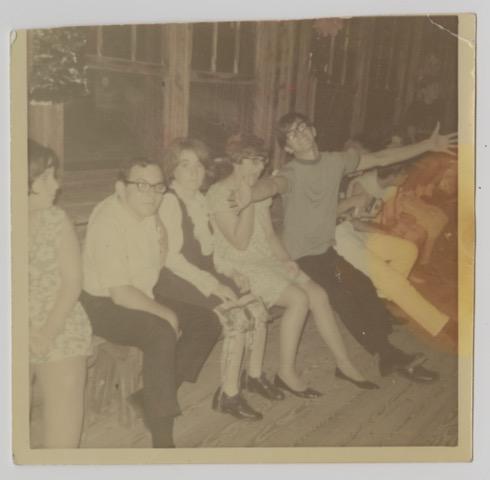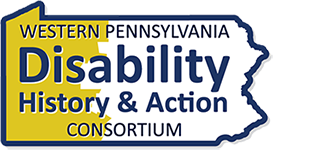By Taylor Akers, Preservation Associate

Kathleen Kleinmann, a founding member of the of the Western Pennsylvania Disability History and Action Consortium, is a renowned disability rights leader. Throughout her life, she advocated for disability services and independent living. In 1990, she founded Transitional Paths to Independent Living (TRPIL) in Washington County (now Voices for Independence). She retired as CEO in 2019.
Understanding the importance of preserving the story of disability rights in Western Pennsylvania, Kleinmann arrived at one of the first Consortium meetings with a set of advocacy posters to donate the Heinz History Center. A short time later, the Consortium recorded an video history with Kleinmann and two other Western Pennsylvania advocates who, during their childhoods, lived at Pittsburgh’s Memorial Home for Crippled Children (now The Children’s Institute). The interview is part of the Consortium’s Voices of Change project, which preserves firsthand accounts of disability history.
Kleinmann’s life story as a person with a disability has intersected with many hard-won gains in disability rights, such as the Americans with Disabilities Act of 1990, and the Rehabilitation Act Amendments of 1992 and 1998. Her life experiences also reflect the ways that people with disability have empowered themselves and fought for change.
The Consortium encouraged Kleinmann to consider establishing a collection at Heinz History Center with materials from her personal and professional life. In 2023, the Consortium received several boxes of materials from her, which were then transferred to the Heinz History Center. Selected items were added to the existing Kleinmann Collection, further preserving her legacy.
Many of these items were from Kleinmann’s childhood and her experiences at Easter Seals camps. These recreational camps for disabled children were reminiscent of the 2020 documentary, Crip Camp: A Disability Revolution, that featured New York’s Camp Jened in 1971.
In the Summer 2025 issue of Western Pennsylvania History, Sierra Green, the Senior Outreach Archivist at Heinz History Center, writes more about Camp Easter Seals in her article, “Pittsburgh’s Crip Camp.”

Founded in 1949 and located in Somerset County on the grounds of Laurel Hill State Park, Camp Easter Seals was a social safe haven for youth with disabilities. Green writes: “It was a place where Kathleen shed her shyness and was finally free to explore her identity outside of her disability…It was a place where she could dream and discover a future in the face of such broad marginalization and stigma outside of camp.” Consisting of traditional summer camp experiences and activities like swimming and crafts, Camp Easter Seals was a much-needed getaway for young Kathleen and other children with disabilities.
Green’s article features images of the donated letters and photographs in the 2023 acquisition. Capturing the essence of young Kathleen’s found freedom, these artifacts prove just how influential Camp Easter Seals was to its participants. Green writes: “The emotional weight of each item was evident, from the book of camp songs to the weathered pages of the camp’s newsletter to the commemorative patch from 1966.” One of the photographs from this collection of camp material is currently on display in the History Center’s exhibit, Pittsburgh’s Hidden History.
Thanks to Kleinmann’s generous donations of items, her participation in the Voices of Change Oral History Project, and Heinz History Center’s ongoing partnership with the Consortium, Camp Easter Seals will be remembered for years to come.
If you would like to read Sierra Green’s full article. “Pittsburgh’s Crip Camp,” you can view or download it below.


